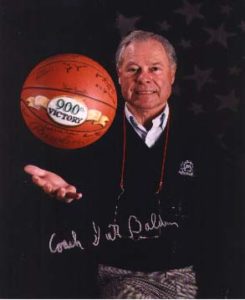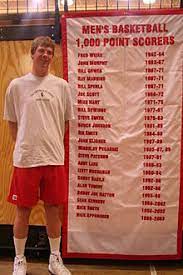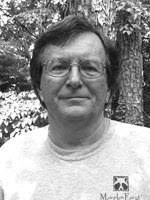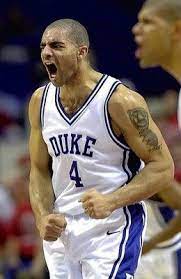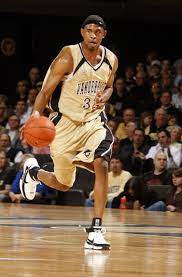You might not recognize the name Dick Baldwin but perhaps you should. He spent 40 years as head coach at Broome Community College, then 5 more at Binghamton in the 1990s. He was so successful that he actually surpassed the legendary Adolph Rupp to become the nation’s all-time wins leader at any level when he got #876 in the 1980s. His final stats are mind-boggling: 1302 games and 961 wins (which means he won almost 75% of his games). HoopsHD’s Jon Teitel got to chat with Jim Norris (1 of his assistant coaches), Tim Schum (1 of his golf buddies), and Sandy Thomas (1 of his daughters) about Dick’s leadership as a player and his near-half-century as a coach. Dick passed away in 2011 but today would have been his 100th birthday so we take this time to celebrate his life/legacy.
Dick got the ironic nickname “Biggie” in college because he was the smallest man on the team as a 5’8” forward: who gave him the nickname, and how did he like it? Sandy Thomas: My dad seemed to have gotten the nickname “Biggie” at the beginning of college or during high school. The Rochester newspaper articles used it from the get-go. Dad’s biggest regret at the end of his career was dropping the nickname, although I am sure he did so for my mom because she did not seem to like nicknames. Tim Schum: First off, I believe he was what 1 might refer to today as a “point guard.” He ran the show even though it was an extremely intelligent team: 2 of his teammates (John Baynes and Dick Baroody) later became very successful high school coaches in the Rochester area. I do not know exactly who gave him the nickname but I believe it was in reference to the fact that he “played big” or had a presence much bigger than his stated height. He was a tremendous competitor who never gave an inch. As a player at Rochester he was part of a group known as the “Four Bs” that led UR to some of its greatest seasons: Baldwin, Baynes, Baroody, and James Beall. Perhaps 1 of them gave him the nickname? In any case, I never heard him complain about it. Before I relocated to Binghamton to begin my own coaching career in the community, I recall people at UR always referred to him by his nickname but rarely did I hear people in the Binghamton community refer to him as “Biggie.”
He was captain of the basketball team: what was his secret for being a good leader? ST: My dad had some very important men in his life that he met through school and sports. His father died when he was 9 and my dad ended up at an Episcopal Military Prep School in Niagara Falls called DeVeaux. Charlie Metz was his coach/teacher: I believe he mentored my dad and inspired him to go into coaching. Dad played under many different types of coaches in college: his football coach was Dud DeGroot (who later became coach of the Washington Redskins) and his basketball coach was Lou Alexander. Daily News writer Wayne Coffey once wrote, “There is a solidity and steady going wholesomeness about Baldwin that evokes a bygone era: he would have fit very nicely in ‘Hoosiers’.” Jim Norris: Coach Baldwin was decisive, thorough, fair, well-organized, and a man of great integrity. Those qualities made him a good leader but most of all he led by example. TS: I think that he had an ability to maximize/merge his native physical ability with an ability to dissect a game and make good decisions under pressure. I offer this after watching him coach and being his golf partner. The bigger the challenge, the better he performed. I assume that was how he played every sport he tackled: he played football(!) as well as basketball and golf at UR. Perhaps more than most coaches I have come across, Dick was way above average in terms of intelligence. I believe he led not only by example but could also inspire his teammates by relating to them on an individual basis. In summary, he never asked for any quarter and never gave any. That has to have been a quality that endeared him to his teammates and (later) his players.
He spent 3½ years in the Army Air Force during WWII as a mechanic/pilot instructor: what impact did his military service have on him either on or off the court? ST: I think the greatest impact was when his younger brother Babe died. Dad even tried to switch over to the Infantry: he was a bomb sight mechanic who taught soldiers how to use the devices. TS: It must have further honed the leadership qualities he demonstrated in college. I know that he remained in great physical condition: he mentioned to me that the service utilized soccer (a sport I coached at Binghamton) as a training game and he came to appreciate the sport via that introduction to it. I think the service must have also given him a certain perspective on life. I believe the loss of his brother was something that he never got over. Obviously the service demands discipline and I always felt he was a highly-disciplined individual.
In 1947 he was hired at Broome Community College as a coach in several sports (basketball/golf/baseball/cross country) and as a professor of English: why did he take the jobs, and how did he like teaching? ST: My dad was one of the first professors hired at Broome Tech after WWII. Coaching was never his main job: he was actually a professor/athletic director. He approached teaching and basketball alike: be prepared/patient, and expect hard work and good results. My dad brought a typed “lesson plan” to each and every practice: he thoroughly prepared for every practice/game. JN: Coach Baldwin loved teaching regardless of the subject and felt that coaching was teaching. Most coaches develop plans for their practice sessions but Coach Baldwin developed “lesson” plans and always referred to them as such. TS: I think he saw Broome as a place where he could impact the growth of the school in a positive manner. Not that it was evident at first but it offered him the type of control that he liked. President Cecil Tyrrell was a “basketball guy” from the Midwest who even played with John Wooden at Purdue so it was a perfect marriage from an administrative standpoint. As far as teaching was concerned, Dick was a natural teacher. He identified a subjects’ goals/objectives and designed a plan to evaluate how his students achieved them. Whether it was a class like English or a sport like basketball he viewed the subject matter as a means to change behavior.
He also spent almost 4 decades as athletic director: how did he balance being an administrator with being a coach? ST: By being organized. In 1975 my son (who became his namesake) was born. Dad was supposed to be in California to give a presentation at a basketball conference but he came to see his grandson instead, so the conference asked legendary coach Adolph Rupp to fill in for him!
He won 879 basketball games at Broome and in the 1980s he actually surpassed Adolph Rupp as the “winningest college basketball coach in history”: what made him such a great coach, and do you think that he will ever make the Hall of Fame? ST: He was like a “chess master” moving the players around the court, especially when the rules allowed a slow-down game. He was really good at that and had the advantage when outmanned. He had integrity, knew the rules, and abided by them to the letter (both in basketball as well as golf). He was innovative: 1 season he used 9”X11” signs with pictures designating the plays. I made the signs myself: 1 was a “catbird” that I designed. 1 season they pulled out 5 small stools during the timeout huddles that allowed the players to rest. His 1st major player from NYC was Frank Streety, who wore the number “00” and later played with the Globetrotters in the mid-1960s. His assistant coach Jim Norris said that my dad had integrity, was a motivator, and a man of few words. He rarely raised his voice and was positive/humble/confident. He was cerebral in his approach to the game. Dad had 961 wins in his career: he often said that “THE EFFORT to win is everything” and believed that “winning is everything.” He also believed that coaching at a 2 year school was especially hard because every year you were creating a new team: getting to know new players, figuring how they fit together, etc. Dad is currently in 5 Halls of Fame and I think that he will eventually be in 6. JN: Coach Baldwin was an incredibly intense competitor who hated to lose. He knew and understood both athletics and people very well and his teams were always very well prepared. He had the unique ability to determine the strengths of his players and then get them to play to those strengths. He focused on what a player could do as opposed to what he could not do. Aside from insisting on playing by the rules and doing things the “right way”, Coach Baldwin was also a firm believer in being persistent and having a positive attitude: his teams always exhibited these qualities. I would say without hesitation that the Hall of Fame is absolutely warranted and deserved but I am doubtful that it will ever happen. I personally nominated Coach Baldwin during the spring of 1992 and completed the extensive nomination/application process but I never felt that his accomplishments/credentials were ever given serious consideration. Sadly, I think the HOF is more interested in inducting people affiliated with professional, Olympic, and “big-time” college basketball organizations as opposed to a true educator/coach who chose to spend his career positively impacting lives in a small community on a smaller stage. TS: Unfortunately his political “reach” was a bit regional in nature and within that region he probably did not engender in his fellow JUCO coaches/administrators the type of warm feeling necessary for HOF support. Objectively, Dick was not a very good loser. He liked being in control to such an extent that he could not stand not winning. He told me that he felt he would never get national JUCO support until perhaps Coach George Killian was 1st inducted. George was coach at Erie CC and he and Dick battled annually for regional basketball supremacy. Later George moved on to the national JUCO office in Kansas. Apparently between his JUCO coaching and national administrative career, George felt that he was entitled to HOF recognition before Dick. In an attempt to garner HOF support for Dick’s candidacy, some local followers staged a dinner in his honor and invited Dick Vitale/Jim Boeheim to be the featured speakers. Vitale talked about Dick as a “legitimate Hall of Famer” but that was the extent of his work on behalf of Dick’s nomination. Unfortunately, the further we get from his career, the harder it seems it will be for Dick to gain entry.
After stepping down at Broome he later came out of retirement to coach basketball at Binghamton for 5 years: why did he decide to head back to the sideline? ST: Dad came out of retirement partly because he had gotten arthritis in his hands and could not grip a golf club like he needed to: he had been a scratch golfer in his day. During his retirement he was on the Binghamton Country Club’s board of governors and later became its president. JN: Coach Baldwin was in great shape both physically/mentally at age 70 when he decided to return to coaching. I think the challenge of trying to rebuild a struggling program in a community that he truly loved appealed to him greatly. As an aside, I vividly recall his words at his introductory press conference when he stated, “1 change I hope to make, or I should say I expect to make, is to win, or it will be a short tenure.” TS: While he was in retirement the BU coaches noted his attendance at many of our contests and we all thought: this guy misses coaching! Our men’s coach at the time (Dave Archer) was a good guy but due to budget restrictions he was only a part-time coach. Our new AD had the objective of trying to get rid of all part-time coaches as much as possible so in reality it was a merging of forces. Dick wanted to get back into coaching and while retired he could devote his full attention to coaching. Knowing our AD’s thinking, 1 day 3 of us (unbeknownst to each other!) all told AD Joel Thirer to seek out Dick and determine his interest in returning to coaching. Perhaps just as importantly, in attending the games Dick could see that Archer’s team (while young) was talented and had the makings of a good team. He knew that the cupboard was not bare: I forgot to mention that he was an extremely good judge of talent! The rest is history: he took the talent and developed it into the best basketball run we have ever had at BU. Unfortunately, when he took the job he told Thirer that he was not going to spend a lot of time recruiting: that was going to be left to his assistant Jim Norris. In retrospect, Dick shared with me later on that if he had to do it over, he should have spearheaded the recruiting efforts. After the Archer group graduated his last couple of teams were not as talented collectively, and as I previously mentioned Dick did not suffer losing easily so a mutual parting of the ways took place.
When people look back on his career, how do you think he should be remembered the most? ST: His care and concern for players first. They will remember him as a winner, a mentor, and a man of honor/dedication. His former student A. Jan Stalker wrote, “Mr. Baldwin was 1 of my Communication Skills professors. In that capacity, he encouraged my speaking and report writing skills which became so important to me in my business years. I remember him as a leader and a role model for the students that he served.” The March 1, 2012 State of New York Legislative Resolution honoring dad’s contributions to his community reads, “Mourning the death of Richard E Baldwin, coaching legend, distinguished citizen, and devoted member of his community.” JN: I think the obvious answer is that he should be remembered as a “winner”, but I will remember Coach Baldwin as a 1st-class gentleman with great integrity who made a lasting and positive impression and impact on his student-athletes and an entire community for well over a half century. TS: He was an excellent teacher/coach who was extremely competitive. He organized things extremely well both on and off the court. He liked doing things right and gave Broome CC basketball followers the feeling that the program was as big-time as it could be. For many years it was the biggest game in town! Later Broome had to share dual billing with the local professional hockey team but nevertheless he achieved what he took out to accomplish. He could take pride that during his tenure Broome became an excellent 2-year institution with many associating its academic success with the on-court accomplishments of its men’s basketball team. That he achieved later success at Binghamton University further cemented his coaching legacy.

